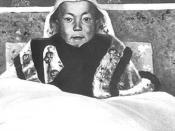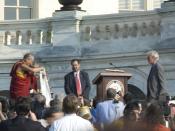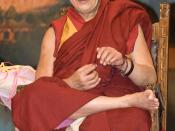There is a burgeoning group in the West who are sceptical about Tibetan
Buddhism and its most prominent member, the Dalai Lama. They say they are
suspicious of the increasing number of wealthy and glamorous people who
flock to teachings by an ever more visible number of Tibetan lamas around
the globe.
Surely, they reason, there must be something rotten in the state of Denmark.
Perhaps pre-invasion Tibet was an oppressed feudal society headed by a
devious band of monks who hoarded power and privilege in their centuries old
monasteries.
And aren't today's lamas pandering to celebrities a bit too much to be
authentic? Is Richard Gere really a Buddhist?
Criticism is no bad thing. In fact, the Tibetans, with their monastic
tradition of logic and dialectic debating, would welcome these sceptics with
open arms.
But given that the debates are now held on the forecourt of monasteries
supplanted from Tibet to India and Nepal it may be more convenient to sit on
the couch and watch 'The Teacher'.
In it, His Holiness Tenzin Gyatso, the 14th Dalai Lama, talks about the most
simple tenets of Buddha's teachings - which will perhaps explain the lamas'
egalitarian attitude towards the wealthy and the less privileged.
Put simply, the first of the Four Noble Truths, the first recorded teaching
by Buddha, is that suffering exists in all our lives whether we are wealthy
or poor, beautiful or ugly, privileged or disadvantaged. This happens
largely because we have trained our minds to discriminate between good or
bad events, depending upon their effect on the most important person in our
lives ... us.
Once we get a touch of what we think will make us happy we strive to make it
permanent. Some do it by acquiring a house, or a car, or...


